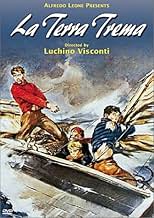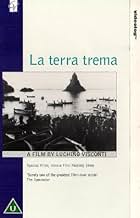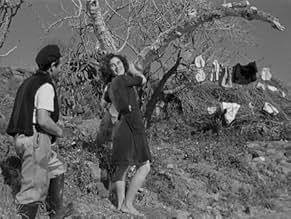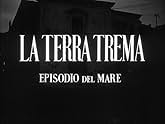IMDb रेटिंग
7.8/10
6 हज़ार
आपकी रेटिंग
अपनी भाषा में प्लॉट जोड़ेंIn rural Sicily, the fishermen live at the mercy of the greedy wholesalers. One family risks everything to buy their own boat and operate independently.In rural Sicily, the fishermen live at the mercy of the greedy wholesalers. One family risks everything to buy their own boat and operate independently.In rural Sicily, the fishermen live at the mercy of the greedy wholesalers. One family risks everything to buy their own boat and operate independently.
- निर्देशक
- लेखक
- स्टार
- पुरस्कार
- 1 जीत और कुल 1 नामांकन
Luchino Visconti
- Narrator
- (वॉइस)
- (बिना क्रेडिट के)
Antonio Pietrangeli
- Narrator
- (वॉइस)
- (बिना क्रेडिट के)
Antonio Arcidiacono
- Ntoni
- (बिना क्रेडिट के)
Giuseppe Arcidiacono
- Cola
- (बिना क्रेडिट के)
Venera Bonaccorso
- La vecchia che ride
- (बिना क्रेडिट के)
Nicola Castorino
- Nicola
- (बिना क्रेडिट के)
Rosa Catalano
- Rosa
- (बिना क्रेडिट के)
Rosa Costanzo
- Nedda
- (बिना क्रेडिट के)
Alfio Fichera
- Michele
- (बिना क्रेडिट के)
Carmela Fichera
- La baronessa
- (बिना क्रेडिट के)
Rosario Galvagno
- Don Salvatore, il maresciallo dei carabinieri
- (बिना क्रेडिट के)
Agnese Giammona
- Lucia
- (बिना क्रेडिट के)
Nelluccia Giammona
- Mara
- (बिना क्रेडिट के)
Ignazio Maccarone
- Maccarone
- (बिना क्रेडिट के)
Giovanni Maiorana
- Un bambino
- (बिना क्रेडिट के)
Antonino Micale
- Vanni
- (बिना क्रेडिट के)
Maria Micale
- La madre
- (बिना क्रेडिट के)
फ़ीचर्ड समीक्षाएं
Although it was supposed to be a documentary, Visconti put in a slight story line to achieve what a documentary would have done, AND MORE. --He used no professional actors, just native Sicilian fishermen, and other villagers, to play all parts. -- The film uses no artificial lighting, no sound enhancement, sound-effects, or dubbing. -- It was filmed on location in, and around, the crumbling homes of the poor villagers, and it was recorded in the Sicilian dialect (rather than proper Italian), and although it has a documentary "look", Visconti shows the exploitation of the poor by the capitalist middlemen so much more effectively than any documentary could have done.
-- Also, while not the first neo-realist film of that post-war Italian genre, this was the first film to be described by the term: "neo-realist". --A brilliant film on all counts. I rated it "10".
-- Also, while not the first neo-realist film of that post-war Italian genre, this was the first film to be described by the term: "neo-realist". --A brilliant film on all counts. I rated it "10".
Luchino Visconti's epic on a family living in the Sicilian fishing village of Trezza, the Valastros, is a compelling story, told with sincerity and skill, and for the outsider viewing into their world it's at the least interesting and at its most heart-felt is rather affecting. Narrators Visconti and Antonio Pietrangeli themselves are outsiders to the world of dirt-poor fishermen who work their entire lives to earn pittance for the wealthy wholesalers (it's based on a novel, I Malavoglia- translated as Ill Will- by Giovanni Verga).
Their narration can hint the audience member on little details that wouldn't be known from the characters, however sometimes their voice-over, in such a documentary style (before this Visconti was among a group of directors for a documentary during world war 2 that is not listed on this site but it mentioned in the documentary My Voyage to Italy) can be a little deterring as they mention certain emotions the characters are feeling that we as the audience can determine right in the eyes.
The story tells of the Valastros, in particular 'Ntoni, an idealist who returns from fighting in the war with a much different view of the environment around him than what his elders would want to believe. Unlike his grandfather, who has worked for the wholesalers and not earned and saved a cent more or less than his children, he wants change in the way things are done, and soon gets enough money to build his own boat and to sell his own fish.
Things look optimistic, until nature intervenes in destroying the boat, leaving 'Ntoni without a job, the wholesalers laughing at him mercilessly and little by little loosing any respect he had in the village. His other family members also get time on the screen- two sisters who want to meet a man to marry, and how one is at the will of God and the other is at the will of the Don of the village, Don Salvatore; also a brother, who after losing his job becomes a smuggler bringing in cigarettes. Their stories, in a pacing that may have some wondering when it will end and some wondering if it can go on longer, lead up to a heartbreaking climax for each of them.
I learned shortly after viewing La Terra Trema that Luchino Visconti (I suppose it shouldn't have been much of a surprise considering the state Italy was in before, during, and after the war) was a lifelong member of the Communist party despite being raised in a wealthy environment in Northern Italy. While I had a feeling there was something about the way Visconti depicted the Volostros and the nature of the people and the village that seemed "for the working man", but I didn't really feel that the political intonations were a crutch to the overall execution of the film. Since one of the pin-points of neo-realism is to tell things as simply as they unfold in real life, no matter how downtrodden it can get, the focus of the fishermen versus the wholesalers is made more as a reflection of basic good versus evil, and it can appeal to those who don't want a strict tale of classes.
Its humanity is what shines through, and that is what should appeal to connoisseurs of neo-realism and Italian filmmaking; while I can't quite recommend it as much as The Bicycle Thief or Open City, I can recommend it as the first film people should see if they want to know and understand the work of Visconti, his operatic intonations with his players a graceful counterpart to his documentary techniques.
Their narration can hint the audience member on little details that wouldn't be known from the characters, however sometimes their voice-over, in such a documentary style (before this Visconti was among a group of directors for a documentary during world war 2 that is not listed on this site but it mentioned in the documentary My Voyage to Italy) can be a little deterring as they mention certain emotions the characters are feeling that we as the audience can determine right in the eyes.
The story tells of the Valastros, in particular 'Ntoni, an idealist who returns from fighting in the war with a much different view of the environment around him than what his elders would want to believe. Unlike his grandfather, who has worked for the wholesalers and not earned and saved a cent more or less than his children, he wants change in the way things are done, and soon gets enough money to build his own boat and to sell his own fish.
Things look optimistic, until nature intervenes in destroying the boat, leaving 'Ntoni without a job, the wholesalers laughing at him mercilessly and little by little loosing any respect he had in the village. His other family members also get time on the screen- two sisters who want to meet a man to marry, and how one is at the will of God and the other is at the will of the Don of the village, Don Salvatore; also a brother, who after losing his job becomes a smuggler bringing in cigarettes. Their stories, in a pacing that may have some wondering when it will end and some wondering if it can go on longer, lead up to a heartbreaking climax for each of them.
I learned shortly after viewing La Terra Trema that Luchino Visconti (I suppose it shouldn't have been much of a surprise considering the state Italy was in before, during, and after the war) was a lifelong member of the Communist party despite being raised in a wealthy environment in Northern Italy. While I had a feeling there was something about the way Visconti depicted the Volostros and the nature of the people and the village that seemed "for the working man", but I didn't really feel that the political intonations were a crutch to the overall execution of the film. Since one of the pin-points of neo-realism is to tell things as simply as they unfold in real life, no matter how downtrodden it can get, the focus of the fishermen versus the wholesalers is made more as a reflection of basic good versus evil, and it can appeal to those who don't want a strict tale of classes.
Its humanity is what shines through, and that is what should appeal to connoisseurs of neo-realism and Italian filmmaking; while I can't quite recommend it as much as The Bicycle Thief or Open City, I can recommend it as the first film people should see if they want to know and understand the work of Visconti, his operatic intonations with his players a graceful counterpart to his documentary techniques.
I saw this movie Friday night on TCM. I'd never heard of it, but I'm a neorealismo fan, so I watched. I'm sorry I didn't tape it, what an epic! Like "The bicycle thief," this movie uses real people, and almost feels like a documentary at times. I agree that the sentiments are rather marxist, but I have to admit that if I lived as these people do, I might be drawn to communism, too. There are some subtle (or maybe not so subtle) references to the politics of the times, wall posters about Mussolini and the hammer and sickle images painted on the walls. Oddly, this movie reminded me somewhat of "Man of Aran," the images are that stark, life is that bleak. The film is beautifully shot, and the story is wrenching. Watch it if you get the opportunity. It memorializes a way of life that is gone, and I'll bet there's not a single person who misses it.
This moving slice of life has several acts and moves like an opera, but the scenes are "neo-realistic" in the best sense.
All of Visconti's actors are from the Sicilian fishing village, but they were not acting--just portraying their lives. You care about these real people!
Family is everything--and it survives despite the buffeting by the storms, the stranglehold of the oligarchical wholesalers, and shortsightedness of the townspeople. We see the exploitation of the fishermen vividly and how most accept it as "God's will."
It also brings to mind the old joke: What is the difference between capitalism and communism? Capitalism is the exploitation of man by man, and communism is just the reverse.
All of Visconti's actors are from the Sicilian fishing village, but they were not acting--just portraying their lives. You care about these real people!
Family is everything--and it survives despite the buffeting by the storms, the stranglehold of the oligarchical wholesalers, and shortsightedness of the townspeople. We see the exploitation of the fishermen vividly and how most accept it as "God's will."
It also brings to mind the old joke: What is the difference between capitalism and communism? Capitalism is the exploitation of man by man, and communism is just the reverse.
It's hard to believe that I am the first person to comment on this masterpiece at this website. One reason could be that it's not that easy to see. Thank God for Turner Classic Movies, which is where I finally saw it. I'm happy to see that there's a DVD available.
This is one of those amazing films that uses only non-professionals and in which they perform as well, if not better, than any professional could. The actors are the inhabitants of a small Sicilian fishing village. The film is cliche-ridden (the Marxist variety) and at times predictable. I didn't care about any of this. The film is a true epic about a few people trying to break out of their rut of exploitation and the wretchedness of their everyday living, and failing. The film thus achieves the status of true tragedy. This one shouldn't be missed.
This is one of those amazing films that uses only non-professionals and in which they perform as well, if not better, than any professional could. The actors are the inhabitants of a small Sicilian fishing village. The film is cliche-ridden (the Marxist variety) and at times predictable. I didn't care about any of this. The film is a true epic about a few people trying to break out of their rut of exploitation and the wretchedness of their everyday living, and failing. The film thus achieves the status of true tragedy. This one shouldn't be missed.
क्या आपको पता है
- ट्रिवियाThe cast was exclusively composed of non-professional actors. They were genuine fishermen and inhabitants of Aci Trezza (Sicily). The credits do not name any of the actors, who are collectively listed as "Pescatori Siciliani" (Sicilian Fishermen).
- भाव
Title Card: [in Italian] In Sicily, Italian is not the language of the poor.
- इसके अलावा अन्य वर्जनWas originally released without Italian narration, but it flopped because the Italian audience could not understand the Sicilian dialect. Visconti re-released it with his own narration, which many find detracts from the film.
- कनेक्शनEdited into Bellissimo: Immagini del cinema italiano (1985)
टॉप पसंद
रेटिंग देने के लिए साइन-इन करें और वैयक्तिकृत सुझावों के लिए वॉचलिस्ट करें
- How long is La Terra Trema?Alexa द्वारा संचालित
विवरण
बॉक्स ऑफ़िस
- दुनिया भर में सकल
- $1,664
- चलने की अवधि
- 2 घं 40 मि(160 min)
- रंग
- पक्ष अनुपात
- 1.37 : 1
इस पेज में योगदान दें
किसी बदलाव का सुझाव दें या अनुपलब्ध कॉन्टेंट जोड़ें























